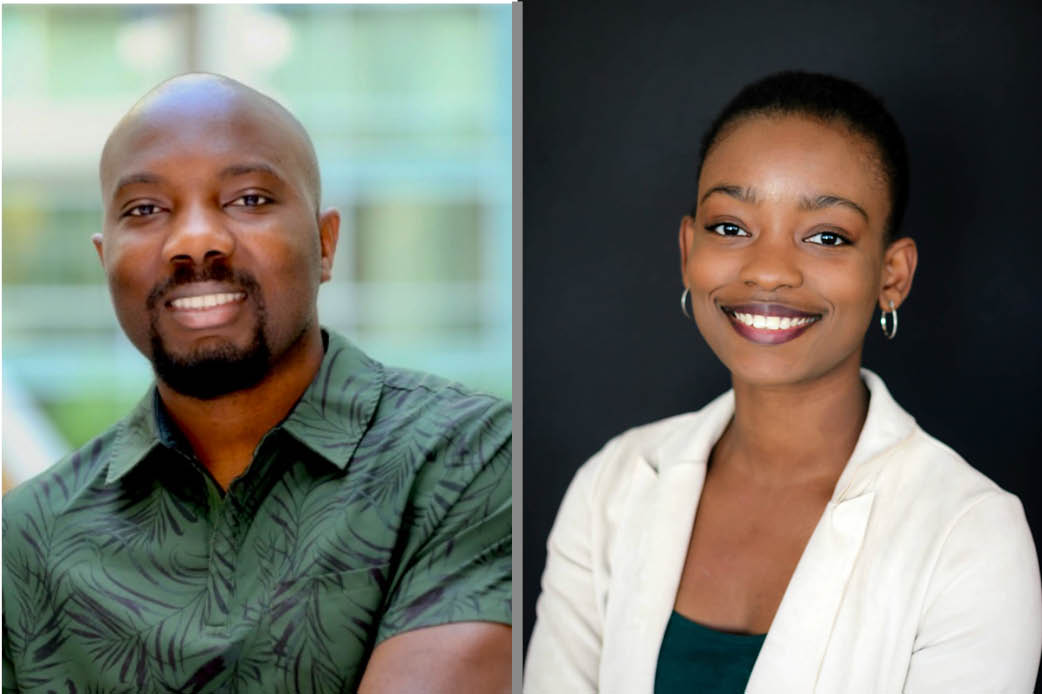
A wedding, two Ph.D.s and a move to Montreal are all on the agenda over the next nine months for University of the Ozarks alums Ralph “JP” Jean-Pierre and Gaëtane Ternier.
Jean-Pierre and Ternier, both 2020 Ozarks graduates from Haiti, were married in Northwest Arkansas on Dec. 7, and that’s just the start of a busy next few months for the couple.
Jean-Pierre is expected to complete his Ph.D. in agricultural economics from Oklahoma State University in May 2025. Ternier is expected to complete her Ph.D. in biochemistry from the University of Arkansas in August 2025. The couple will move to Montreal following their wedding where Jean-Pierre has an academic research position secured at the Université de Montréal.
“There’s certainly a lot going on for us right now, but we wouldn’t want it any other way,” Jean-Pierre said. “It’s an exciting time.”
Jean-Pierre earned a major in business administration with minors in sustainable agriculture, creative writing & thought and economics from Ozarks. He said he decided to pursue a Ph.D. in agricultural economics because of an incident that had a major impact on him and his family while growing up in Haiti.
His family members were agricultural producers in Saint-Louis du Sud, a rural town in the southern department of Haiti. They raised livestock, including swine. In the early 1980s, an outbreak of African Swine Fever (ASF) in Haiti forced many rural families, including his own, to leave their livelihoods behind.
“Following the ASF outbreak, the government implemented a nationwide swine depopulation campaign to limit the disease’s spread and many farmers received no compensation for their losses,” Jean-Pierre said. “This campaign led to disruptions, a large-scale rural exodus, and increased emigration to neighboring countries. This experience ignited my interest in understanding the economic impacts of animal diseases and inspired me to pursue a career dedicated to identifying solutions that protect communities from similar challenges.”
Jean-Pierre said his career goals are “to contribute to impactful research in animal health economics, with a focus on education, innovation, and cost-effective solutions for disease management, particularly in rural areas and developing countries where this intersection of livestock health and economic stability is often the most consequential to both producer and consumer well-being.”
Since his time at OSU, Jean-Pierre has been awarded the International Livestock Research Institute Ph.D. Research Fellow (2023-2024), the Williams Distinguished Graduate Fellow (2023), the Stoecker Family International Agricultural Economics Fellow (2023) and the Leonard F. Miller Distinguished Graduate Fellow in International Rural Development (2021-2022). The title of his Ph.D. dissertation is “Foot-and-Mouth Disease Management and Consequences on Rwanda’s Cattle Sector: A Multi-Model Approach Integrating Livestock Dynamics, Epidemiology and Economics Analysis.”
At the Université de Montréal, he will join the Plateforme AI-Agrosanté (PIAAS) where his research focus will be on “Economic and Health Implications of Artificial Intelligence in Livestock Disease Management and Incentives for Farmer Adoption.”
“The main goals of this research will be to understand the potential opportunity losses associated with on-farm AI non-adoption to prevent or control a potential disease spread; analyze the costs, benefits, and market impacts of AI adoption; and disseminate research findings through workshops and trainings to reduce the gap between scientific research and practical implementation within Quebec’s agri-food sector,” he said.
Jean-Pierre said the LENS curriculum at Ozarks helped guide him on his career course.
“Ozarks encouraged me to explore my strengths outside of my comfort zone, and the LENS program played an important role in shaping my career as an agricultural economist,” he said. “When I arrived at Ozarks, I was set on majoring in business administration, with an economics concentration, but the LENS program required me to select a minor in the natural sciences. On the advice of my advisor, Christine McCain, I chose sustainable agriculture. This decision helped me discover my passion for applying economic principles to the agricultural sector.”
Ternier, who earned majors in chemistry and biology at Ozarks, said her research centers around the metabolic and structural characterization of fibroblast growth factor (FGF) proteins. Her Ph.D. dissertation is titled, “Characterization of the Structure and Function of Recombinant FGF19.”
“My interest in biochemistry is sourced from the importance that plant-based remedies have in the Haitian society as compared to conventional methods,” she said. “I became particularly intrigued by how plants, often considered poisonous, can also serve as effective treatments for diseases. I first wanted a career in pharmacy, but my journey shifted upon attending my first college biochemistry class. My first week in this class was the moment I realized my desire for knowledge extended far beyond drug interactions; I wanted to understand the molecular mechanisms orchestrating our physiological responses.”
Ternier said her career goal is to make a “meaningful contribution to patient health within a clinical or pharmaceutical setting. I want to collaborate with medical professionals and conduct research that has a direct, positive impact on both patient care and clinical practices.”
She credited her Ozarks education for sparking her interest in research.
“Ozarks culture as a smaller community facilitates students and faculty interactions, which benefited my decision-making in terms of graduate program selections and preparations for success,” Ternier said. “Graduating from Ozarks with a double major in biology and chemistry gave me a diverse perspective. My background in biology gave me a better understanding of cellular processes and physiological systems, which is essential for my research on FGF19.”
Jean-Pierre and Ternier have known each other since their high school years in Haiti and began dating shortly before enrolling at Ozarks. They were married on Dec. 7 at Saint Vincent De Paul Catholic Church in Rogers, Ark., before embarking on a honeymoon to the Florida keys.

Topics: Academics, Business Administration, Chemistry, Sustainable Agriculture
